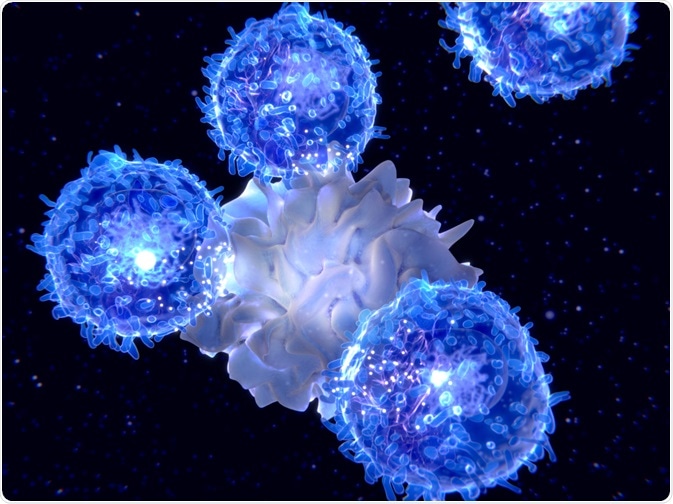Antigens exist in numerous forms, but they all work within the body in the same way. In this article, we will discuss what an antigen is, and how best to choose the right antigen for raising a specific antibody.

Image Credit: Juan Gaertner/Shutterstock.com
What is an antigen?
As a basic description, an antibody can be described as any molecule that has epitopes (antigenic sites) that fit with corresponding antibodies, initiating an immune response.
Antigens come in many forms, they can be simple molecules, toxins, chemicals, viruses, bacteria, synthetic antigens, or other foreign substances that enter the body. In addition, the body’s tissue and cells, as well as cancer cells, can also have antigens on them that can be used as biological markers in lab tests to identify those specific tissues or cells.
While antigens refer to a whole family of substances, they all share a common mechanism of initiating the production of a specific antibody or immune cell or otherwise communicate directly with these immune response substances.
All antigens are molecules that enter the body of a vertebrate and provoke an immune response. This is referred to as immunogenicity. In addition, all antigens interact with a molecule, an antibody, either chemically or physically to evoke certain changes that specifically lead to activating an immune response.
Antigens have epitopes that determine which antibody the antigen interacts with. Epitopes are the parts of the antigen that the immune system recognizes, antibodies, B cells, and T cells all register the antigen’s epitope. Usually, either one to six monosaccharides or five to eight amino acid residues makes up the epitope that forms of the surface of the antigen.
Antigens play a vital role in the management of the adaptive immune system. The human body has two kinds of the immune system, the innate immune system, and the adaptive immune system. The first is able to identify invading microbes due to predetermined, inherited features.
Dendritic cells, macrophages, neutrophils, and other kinds of cells are all types of innate immune cells. The adaptive immune system, on the other hand, encompasses T and B lymphocytes that have antigen receptors capable of recognizing new threats in the form of invading substances that the body has no pre-programmed response for.
Because of this, the immune response that responds to these antigens is highly specific to the invading molecule.
Factors that affect antigen-antibody interaction
The impact of the antigen on the host body depends on the interaction between the antigen’s chemistry and the host’s physiological state. There are a wide number of factors that can impact the nature of the antigen-antibody interaction, and these factors can be classed as either acting on the equilibrium constant or not. Below we discuss all the factors known to influence the interaction.
First, we discuss the factors acting on the equilibrium constant. Temperature is a major factor that can influence the antigen-antibody interaction. Antigens have optimum temperatures at which they work best, and for example, red blood cell antibodies are generally classified as either warm or cold. Therefore, the temperature can impact the types of bonds formed.
The pH can also act on the equilibrium constant, with the antigen-antibody reaction being strongly inhibited at both sides of the maximum pH (6.5 and 8.4). In addition, ionic strength, false-positive reactions at low ionic strength, polymers and other potentiators, and enzyme treatment can all impact the antigen-antibody interaction through their effect on the equilibrium constant.
Factors that can also influence the interaction but do not alter the equilibrium constant include antigen zygosity, duration of incubation, as well as the concentration of antigen and antibody, and serum/cell ratio. Dilutions of the concentrations, for example, can affect the number of IgG per cell. Interestingly, this effect is seen to be increased for low-affinity antibodies. Similarly, when ratios are altered, the effectiveness of the reaction can be amended due to fewer or greater available antigens to carry out reactions.
How to choose an antigen
When choosing an antigen to use in clinical studies, it is important to note that not all antigens work to the same level of effectiveness or are even suitable for every kind of test. There are several points to consider when selecting an antigen.
First, the antigen needs to work for the application that will be used, such as Western Blot, or immunohistochemistry. The antigen also should be appropriate for the host species and clonality.
Overall, in choosing a good antigen, the following features should be sought: intramolecular areas of stable structure and complex chemical bonding; a molecular weight sitting between 8,000 and 10,000 Da; capability of being processed by the immune system; structurally dissimilar to the host; large stretches that are not constructed from repeating units.
In the case of using peptide antigens, those with immunogenic regions that contain a minimum of 30% amino acids are preferred, and they should also have a sufficient number of hydrophilic or charged functional groups.
Sources:
- Iwasaki, A. and Medzhitov, R. (2010). Regulation of Adaptive Immunity by the Innate Immune System. Science, 327(5963), pp.291-295. https://www.ncbi.nlm.nih.gov/pmc/articles/PMC3645875/#!po=73.8095
- Reverberi, R. and Reverberi, L. (2007). Factors affecting the antigen-antibody reaction. Blood Transfus, 5(4), pp.227–240. https://www.ncbi.nlm.nih.gov/pmc/articles/PMC2581910/#!po=1.66667
- Sela, M. (1998). Antigens. Encyclopedia of Immunology, pp.201-207. https://www.sciencedirect.com/science/article/pii/B0122267656000529
Further Reading
Last Updated: Mar 25, 2020